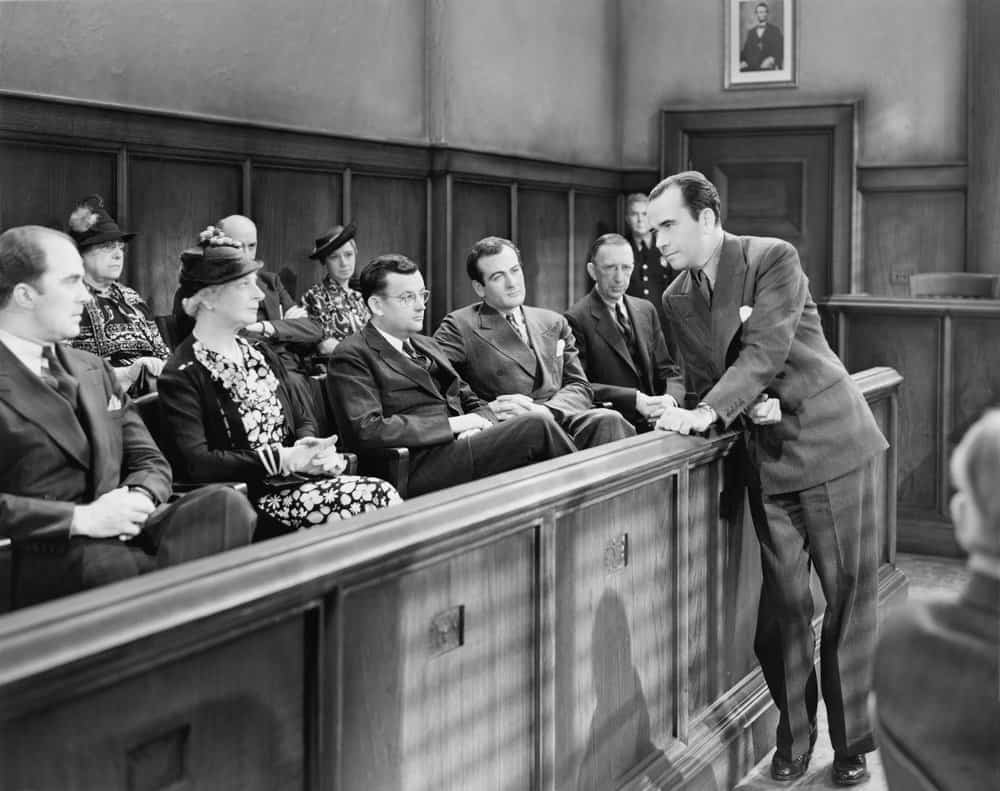Serving on a jury is a civic duty and an essential part of the justice system in the United States. However, not everyone is eligible for jury duty. Various factors can disqualify potential jurors from serving, ensuring that the jury remains impartial and fair. Understanding these disqualifications is important, as it can save you time and stress if you are ever summoned for jury service.
Disqualification criteria vary from state to state, but some common factors can cause an individual to be deemed ineligible for jury duty. Grounds for disqualification typically include age, residency, citizenship, criminal history, and certain mental or physical impairments. Additionally, some people may be exempt or excused from jury service due to their professions or specific circumstances, such as being full-time students or primary caregivers. Remember that if you are excused from jury duty, you can expect to be called up again, so being excused generally means deferring service.
Key Takeaways
- Disqualifying factors for jury duty often include age, residency, citizenship, and criminal history.
- Some individuals may be exempted from jury service due to specific circumstances or professions.
- The juror qualification and selection process varies depending on state regulations and requirements.
Jury Duty: An Overview
Jury duty is a civic responsibility and vital to the legal system. It ensures that citizens have a voice in determining the outcome of a legal proceeding, thus maintaining the principles of fairness and impartiality. Jury service is essential to democratic societies, as it establishes a direct connection between citizens and the judicial process.
The process for jury duty begins with a random selection of potential jurors from a pool of eligible citizens. These individuals receive a summons to report for jury service on a specific date. Upon arrival at the courthouse, they are given instructions and generally await jury selection for a trial.
During the selection process, potential jurors are questioned by the judge and attorneys from both sides to determine their suitability for serving on a specific case. Factors such as prior knowledge of the case, personal biases, and other circumstances may disqualify an individual from jury duty.
Once a juror is chosen, they must adhere to strict guidelines concerning confidentiality and impartiality. Failure to comply with these rules can result in removal from the jury and potential legal consequences. Jury duty typically lasts for a trial, varying from a few days to several weeks, depending on the case’s complexity.
While serving on jury duty is an important civic duty, certain circumstances can disqualify an individual from participation. These may include medical conditions, familial obligations, financial hardship, etc. Potential jurors must be aware of these disqualifications to ensure the jury remains impartial and fair throughout the trial.
Disqualification Criteria and Grounds for Disqualification
Age Requirements
An individual must be at least 18 to be eligible for jury duty. Those younger than the minimum age requirement are disqualified from serving as jurors. Age is critical in jury selection, ensuring jurors have the maturity and life experiences necessary to make well-informed decisions.
Citizenship and Residency
Only United States citizens are eligible for jury duty. Persons who are not citizens of the United States are automatically disqualified from serving as jurors. Potential jurors must also be residents of the judicial district where they are being summoned to serve.
Criminal History
Individuals with a criminal history, specifically those convicted of a felony, are generally disqualified from jury service. If a potential juror has felony charges on their record, it is generally considered a conflict of interest and a potential hindrance to the impartiality of the jury process.
Physical and Mental Capacity
The ability to serve as a juror requires the adequate physical and mental capacity to ensure the health and safety of all involved in the trial process. Thus, individuals with significant health issues, cognitive impairments, or other disabilities that would preclude them from effectively participating in the jury process may be disqualified from serving.
Literacy and Language Proficiency
Jurors must possess adequate literacy skills to read and write at a level necessary to comprehend complex legal information presented in court. Language proficiency is also a key requirement, as jurors must understand spoken English and communicate effectively with other jurors and court personnel. Those lacking sufficient literacy or language proficiency are typically disqualified from jury duty.
Jury Duty Exemptions and Excuses
Occupation-Based Exemptions
Certain professions may qualify for exemptions from jury duty. Public officers, such as police and firefighters, are often exempt due to their essential roles in public safety. Active duty military personnel may also be exempted, as their service obligations precede jury duty. Additionally, members of specialized emergency response teams, such as ambulance crews and rescue squads, may be eligible for exemptions.
Age-Based Exemptions
Age plays a factor in determining eligibility for jury duty, with some jurisdictions having age-based exemptions. Generally, individuals who have reached a certain age threshold, such as 70 or 75, may be exempt from serving on a jury. This is because jury service’s physical and mental demands could be challenging for older individuals.
Health and Hardship Exemptions
Health-related issues can lead to exemptions from jury duty as well. If a prospective juror suffers from a medical condition or disability that would hinder their ability to serve effectively, they may be deemed unfit for service. In these cases, a doctor’s statement or other documentation may be required to support the exemption request.
Additionally, hardship exemptions can be granted when serving on a jury would cause significant personal or financial distress. This might include individuals who are the sole financial providers for their household or those who cannot find appropriate childcare during their service period.
Parental and Caregiver Excuses
Parents and caregivers may be excused from jury duty if their childcare or caregiving responsibilities cannot be met during their service period. For example, a parent may be granted an excuse if they have a young child and cannot find alternative care arrangements. Similarly, individuals who provide care for elderly or disabled family members may be excused if their duties prevent them from serving on a jury.
Juror Qualification and Selection Process
Juror Summons and Questionnaire
Individuals from a judicial district within a city are summoned for jury duty. The jury office sends the summons to notify the potential juror of their responsibility. Upon receipt of the summons, the potential juror must complete a questionnaire. This is a crucial step in the juror qualification process as it helps determine the individual’s eligibility for serving on a trial by jury.
Jury Selection Procedures
The jury selection process begins with a pool of eligible jurors based on the completed questionnaires. At this stage, potential jurors are thoroughly assessed for their suitability to serve on a jury. Factors such as their ability to perform the required tasks, impartiality, and understanding of the juror’s role in a trial by jury are considered.
Requesting an Excuse or Postponement
If an individual believes they have valid reasons for exemption from jury duty, they can petition the court for an excuse or a postponement. Requests should be made via email or fax, per the instructions provided by the jury office. Reasons for requesting an excuse or postponement may vary and will be carefully evaluated by the relevant authorities before deciding.
Specific State Regulations and Requirements
California Regulations
In California, jurors are selected from lists provided by the Department of Motor Vehicles and the Employment Development Department. The following conditions may disqualify potential jurors from service in California:
Age: Citizens between 18 and 70 are eligible for jury duty in California.
Documentation: Potential jurors, such as a driver’s license or passport, must provide proper identification.
Exemptions: Certain individuals may be exempt from jury duty based on occupation or other factors. For example, military personnel and certain government employees may be exempt from service.
Unpaid Fines or Fees: Individuals with unpaid fines or fees may be disqualified from jury duty until they have paid their debts.
Criminal Record: If convicted of a felony, you may not serve on a jury in California. Additionally, individuals with outstanding arrest warrants are automatically disqualified from jury duty.
Mental Illness: Individuals deemed mentally unfit to serve by a medical professional may be disqualified from jury duty.
Massachusetts Regulations
In Massachusetts, jurors are selected from the registered voter list. However, certain conditions may disqualify a person from jury duty. These conditions include:
- Age: If you are over 70, you may request an exemption from jury duty in Massachusetts.
- Breastfeeding: A breastfeeding mother may request postponement of her jury service for up to one year.
- Documentation: Potential jurors must provide proper identification and proof of residency, such as a driver’s license or utility bill.
Texas Regulations
Similarly, in Texas, jurors are selected from various sources, including registered voter lists, driver’s license records, and identification card holders. However, Texas has its own set of disqualifications:
- Age: Individuals aged 70 and above can be exempt from jury duty in Texas.
- Breastfeeding: A nursing mother may request an exemption from jury service.
- Voter status: A nonvoting Texas resident may submit an affidavit stating their lack of interest in voting to avoid jury duty.
- Exemptions: Certain individuals may be exempt from jury duty based on occupation or other factors. For example, military personnel and certain government employees may be exempt from service.
- Unpaid Fines or Fees: Individuals with unpaid fines or fees may be disqualified from jury duty until they have paid their debts.
- Criminal Record: If you have been convicted of a felony within the last 10 years, you may not serve on a jury in Texas. Additionally, individuals with outstanding arrest warrants are automatically disqualified from jury duty.
- Mental Illness: Individuals deemed mentally unfit to serve by a medical professional may be disqualified from jury duty.
Remember that each state may have unique regulations and requirements for jury duty. Knowing the specific laws in your jurisdiction to understand your rights and responsibilities as a potential juror is crucial.





